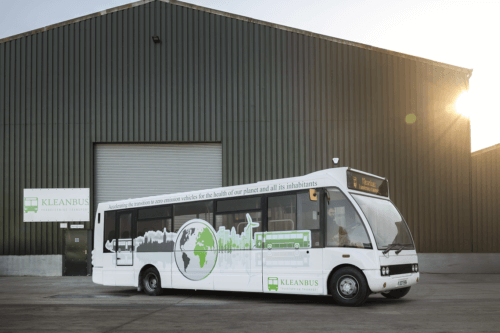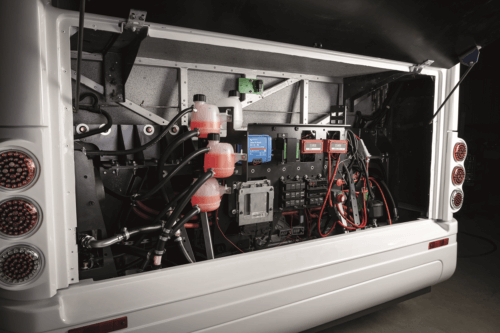
Bus repower company Kleanbus has completed the development of its first modular electric platform, installing the system into its first prototype vehicle. Combining proven e-powertrain components with Kleanbus’ own integration technology and proprietary software, its ‘e-drivetrain in a box’ concept can convert a bus from internal combustion to fully electric drive quickly and cost-effectively, the company says.
With the first system installed in an Optare Solo, Kleanbus is now accelerating its prototype testing programme, with dynamic development taking place at its facility in the east of England. In parallel, the company is entering pilot trials with key bus fleet operators. Technology agnostic, the firm says approach means it can take advantage of the very latest components, enabling it to leverage a wide variety of batteries and motors to create purpose-built e-powertrains tailored exactly to a bus operator’s needs.
From its 9,000 sq ft facility, the Kleanbus repower programme consists of a full base vehicle evaluation and an analysis of operator duty cycles, allowing a conceptual drivetrain to be modelled and validated through simulation. In parallel, the diesel engine and all associated systems are removed, the freed-up space digitised and the design process progressed to create a bespoke electric drivetrain platform that will meet the operator’s duty cycle requirements. Once prototypes are created, they are subjected to a rigorous test and validation programme ahead of certification.
Kleanbus has achieved ISO 9001 and ISO 14001 certifications for its products and practices; ISO 9001 represents the quality management standard of the operation, and ISO 14001 demonstrates environmental standards and a commitment to reducing environmental impact.
Once a model type e-drivetrain solution has been designed and tested, the firm says it takes less than two weeks to repower an individual bus, getting vehicles back in service in as little time as possible. Operating costs come down to around a third of those of a conventional diesel bus, the firm adds, while repowered buses also cost significantly less than a new electric bus. Through partnerships with finance providers, operators can also choose several ways in which to finance the vehicle, ranging from paying upfront and leasing the battery, to paying nothing upfront and leasing both the vehicle and the battery, allowing them to fund the cost of the repower through operating revenue, maximising the business case. Kleanbus can also arrange for an operator’s depot to be upgraded with appropriate charging technology, enabling them to go electric without having to contact third parties, effectively offering a one-stop shop.
Joe Tighe, Co-Founder and CEO of Kleanbus, said: “Momentum is building rapidly with the completion of our ‘e-drivetrain in a box’ and the installation of this modular platform system into our first prototype. We are excited to accelerate our prototype testing programme, with pilot trials also starting this month with two bus operators.
“Leveraging the latest in proven components from leading Tier 1s, our technology-agnostic solution enables us to create an adaptable system that can convert a diesel bus into a state-of-the-art zero-emission vehicle quickly and cost effectively. Kleanbus also provides the complete solution to bus operators, with innovative financing and charging as part of the total package, making it easy to go zero-emission. The potential for repowering is huge: lower operating costs for bus operators and accelerating the transition to a clean future.”


